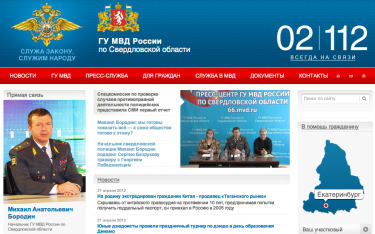Evgeny Roizman [ru] is a controversial figure. A Yekaterinburg [en] based art-collector and former Duma deputy who supported Mikhail Prokhorov’s failed presidential bid, Roizman originally made a name for himself by establishing a non-profit fund [ru] called “A City without Drugs” [ru].
The fund both treats drug addiction and targets dealers, albeit using somewhat vigilante methods. It is known for cooperating with local law enforcement agencies, and Roizman often blogs [ru] on LiveJournal about successful raids and arrests [ru]. Some aspects of the program are especially troublesome, including accusations of use of force and kidnapping [ru] to get addicts into detox.
In spite of these allegations — and because of the fund’s success in reducing drug-related crime — Roizman is a respected politician, activist, and blogger in Yekaterinburg. Since his most recent association with Prokhorov, he has become a prominent member of the opposition, as well as last winter's protest movement. Recently, he has also helped facilitate publicity for Oleg Shein’s Astrakhan hunger strike [ru]. At the same time, his blog, together with the locally based news agency URA.RU, has been at the forefront of publicizing a police corruption scandal in Sverdlovsk Oblast.
Tackling the racketeers
Although locals have apparently been aware of the problem for some time, Roizman first blogged about it on April 4, citing an URA.RU article about racketeering related arson [ru] at a Yekaterinburg market, and tacitly linking the arson to Sverdlovsk Oblast’s new police chief, Mikhail Borodin [ru]. Borodin and over 70 of his underlings are allegedly transplants from the Moscow police.
In his post, Roizman calls these policemen “Muscovites,” and claims that they have taken up many important positions in the regional police infrastructure and are beginning to abuse their authority. “I am carefully studying the situation, and I now have a strong impression that these people are here to rob,” he concludes [ru].

Screenshot of the Sverdlovsk Oblast police website, including Mikhail Borodin's portrait, at http://66.mvd.ru.
Later that day, Roizman linked to another URA article [ru] detailing some of the alleged racketeering. The extortion is apparently centered on openair markets, one of which recently burned down. However, as Roizman himself states in the article, “They take from everyone — banks, car lots, spas, vegetable stands, even the older women who sell sunflower seeds and homemade pickles on the street. Even they pay tribute.”
Roizman later elaborated [ru] that the “tribute” for the sunflower seed sellers amounts to 5,000 rubles (170 USD) per person every ten days.
How does Roizman acquire his information? The answer is that he is not afraid to solicit the public for it. In his second April 4 blog post [ru], he wrote: “Friends! If anyone has any other information about the Muscovite tribute-takers, leave it here or come to the Fund, or call me directly.”
The post soon made it to a Top-25 list [ru] on Livejournal. Although many people were at first afraid of retribution and requested to stay anonymous (leading Roizman to somewhat uncharitably call them cowards [ru]), the information he has collected through such requests allowed him to pen an official inquiry to the Urals Federal Okrug [ru] (where Yekaterinburg is located) on April 9, as well as a brief to a Federal Investigatory Committee [ru] on April 18.
Roizman has described some of the extortion schemes on his blog. For instance, on April 16 he wrote [ru] that: “Several owners of mini-markets from Elmash, Vtorchermet, Viza, and so on came to me on Friday. They brought their official complaints and told me how it happens.”
Roizman attached a scan [ru] of one such complaint with the names blacked out. Small-scale merchants at this particular market were each told by the police to remit 15,000 rubles (510 USD) every month. When they refused, the police confiscated their merchandise, and returned it only after the business owners had each paid 10,000 rubles (340 USD).
Another incident [ru] involves a couch that one of the police chiefs extorted for his office from a local furniture factory. According to Roizman, the police chief later decided that the factory should also pay him protection money. (This version of events is challenged by a local blog with likely ties to the police, on the grounds that the couch was allegedly purchased at IKEA [ru].)
Marginalized and stewing
With so much current focus on Astrakhan and “Pussy Riot,” the mainstream and liberal Russia media have yet to devote any real attention to Roizman's story. The noteworthy exception in this trend has been the U.S. consulate in Yekaterinburg, which called Roizman and asked him for a meeting [ru]. Roizman’s reaction was lukewarm, as was that of over 800 comments to his blog, after he revealed the Americans’ interest.
Nevertheless, he appears to be doing fine on his own. So far, his and URA.RU’s reporting has prompted many people to come forward and file complaints. In an interview with URA.RU [ru], Roizman said that the upper echelons of the region's police and FSB are aware of the situation, but seem to be waiting for word ‘from the top’ to make their move. If that move is not made soon, he warns, the citizens of Yekaterinburg take to the streets in mass protest.
Beyond Russian police corruption (a tired trope for many), this case speaks to the increasingly contentious relationship between the Kremlin and peripheral regions like Sverdlovsk. There is bitterness in the way Roizman constantly refers to the corrupt policemen as Muscovites, seemingly implicating all those who live in Moscow and benefit from the government’s stranglehold on the periphery.
If the situation continues unabated, Yekaterinburg could easily become another hotbed of regional rebellion, like Astrakhan, Ulyanovsk, and Omsk today.








3 comments